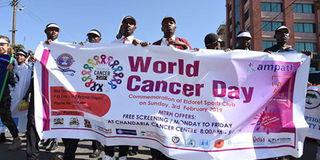Cancer control depends on good health system

Health activists promote cancer awareness in Eldoret town on February 3, 2019. Kenyans suggest that cancer is now a national crisis and we must do something special to deal with it. PHOTO | FILE | NATION MEDIA GROUP
What you need to know:
- Any half-decent health system will have the four important components of health promotion, disease prevention, curative services, and rehabilitation.
A number of prominent Kenyans have in the recent past died from cancer-related ailments, leading to a rising chorus suggesting that cancer is now a national crisis and we must do something special to deal with it.
This chorus is obviously well-meaning and intended to address what looks like an ever-increasing risk of mortal disease in this country.
But our knee-jerk reactions to events, such as those that have assailed us recently, are the hallmark of our ineptitude and failure of imagination.
It is important that we remind ourselves of a few home truths.
At the outset, it must be noted that there is no single disease called “cancer”. The cancers are a collection of dozens of diseases that share the characteristic that the cells in a particular part of the body begin proliferating abnormally, increasing the metabolic burden on the rest of the body and literally sucking the individual’s life away.
Almost any body organ or tissue can develop a cancerous lesion, and the treatments for the various cancers will differ based on the cell types, rate of proliferation, and receptors on the cell surfaces, among others.
TREATMENT
It is therefore difficult to understand calls for purchase of “cancer diagnostic equipment” or provision of “free cancer drugs”.
Cancers are diagnosed based on the signs and symptoms a person displays when seen by a health professional, and confirmed through a variety of laboratory and imaging procedures, many of which are also used for diagnosis of other ailments.
“Cancer drugs”, similarly, will include medications that are effective for other illnesses, and due to the commonly co-occurring illnesses in many cancers, the treatment of any type of cancer is not reducible to any one drug type or treatment modality.
It should therefore be evident to anyone interested in the control of cancer that such control cannot be achieved unless the entire health system is organised to be able to promote healthy lifestyles, prevent (all or any) disease, recognise early signs of chronic diseases and initiate early treatment.
Any half-decent health system will have the four important components of health promotion, disease prevention, curative services, and rehabilitation.
HEALTHY LIFESTYLE
At the primary healthcare level, which should be the main preoccupation of our county health systems, health promotion and disease prevention should reign supreme.
Ensuring a healthy environment, provision of safe drinking water, control of substance use, and promoting activity by providing spaces in which people can safely play, walk or cycle are just some of the interventions that would go a long way in slowing down the march of cancer and other chronic diseases.
At lower level health facilities in the counties, routine health checks should be encouraged, including screening for common chronic conditions and early linkage to care.
This way, many malignancies will be identified long before they spread and cause significant damage, much the same way other chronic diseases like mental illnesses, metabolic conditions and cardiovascular diseases would.
In such a system, only a few people with established and complicated illnesses would require specialised services that would then be offered at regional and national referral facilities.
Unfortunately in Kenya, we will prefer to build more “cancer hospitals” without the requisite structures being put in place in the rest of the health system, ensuring more of the same as long as the tenderpreneurs get their cut.
Lukoye Atwoli is Associate Professor of Psychiatry and Dean, Moi University School of Medicine; [email protected]





